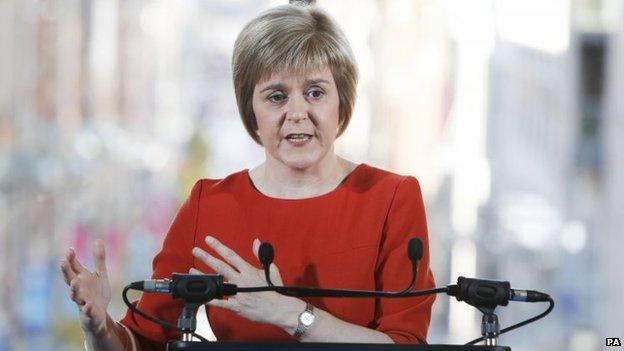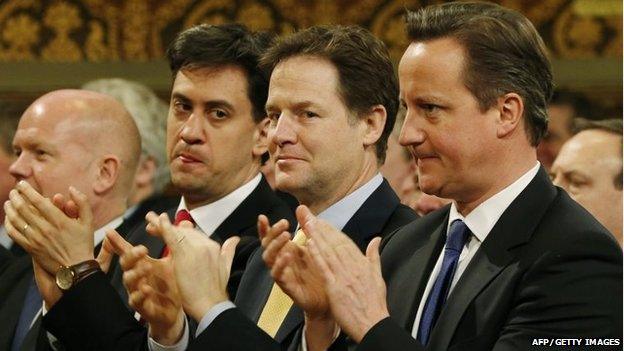If not independence...
- Published

After the Scottish independence referendum delivered a "No" vote, thoughts now turn to further devolution
If not independence, then what? That is now the immediate focus of the Scottish body politic.
Not, however, the sole focus in that a significant section of the populace does not accept that independence should be entirely abandoned as an objective.
Let us deal with that latter point first. Union supporting political leaders - including the Prime Minister in a BBC Scotland interview - have lined up to suggest that the SNP, that the leader in waiting, should proclaim that independence is no more, that it is, in avian terms, an ex-parrot.
We may be sure that bird won't fly. Nicola Sturgeon may be certain of victory in the SNP leadership contest - but it would be stretching things a little, even given her evident popularity, to begin her term by consigning her party's long held objective to history.
Plus we should pay attention to what she is actually saying.
She says she accepts the referendum result. She says that the only route to eventual independence is through a referendum.

Nicola Sturgeon is the favourite to replace Alex Salmond as First Minister and SNP leader
With regard to that, she is not talking about an immediate rerun - or even an early referendum. She says the circumstances would need to be propitious. Which means, deliberately, everything and nothing. All she is doing, in reality, is saying that her much expanded party still supports independence.
Still, one understands the perspective adopted by those supporting the Union. They are seeking to emphasise the small point that the No side won the referendum. It was relatively tight. It was very far from a rout. But it was a victory.
Which brings us back to that new key question: if not independence, then what? The Smith Commission has begun its examination of that very point.
No special status
Intriguingly, Lord Smith has taken pains to stress that his Commission consists of himself - plus civil service advice from Edinburgh and Whitehall. Not, therefore, a panel of politicians. It is not quite: "l'état, c'est moi." Nothing so regal: indeed quite the opposite.
I believe Lord Smith is stressing two points.
That he wants to consult the people more widely - with no special status for political parties, even although he will hold talks with nominated representatives. And that he wants to be free to reach his own conclusions from multi-lateral and bi-lateral discussions.
And, therefore, presumably to be free to complain if Westminster later departs from the consensus he achieves.
Different standpoints
In the next few days - probably next week - the UK Government will publish a command paper summing up the present position and offering pointers to the future. Given that these are early days - and given that the coalition parties have adopted different standpoints - I would not expect this to be anything like a final position paper.
Rather it will be a contribution to the continuing debate and discussion. Which has tended to focus at this early stage upon income tax. Should it be devolved to a greater extent? Or in full?
I've been discussing that with a couple of experts in the field of public finance and governance. Their advice, in essence, is: careful what you wish for. That reflects a relative caution in parts of the body politic.

Politicians are represented in the Smith Commission - all with different ideas on devolution
The Conservatives are advocating the complete transfer of income tax to Holyrood - with the exception that the starting point for entering tax would be reserved. The Tories say that would give Holyrood real clout, adding tax powers to spending control in the fiscal jigsaw.
There are also two potential political gains for the Tories.
One, it would enable Ruth Davidson to offer a tax cut in Scotland - drawing upon the broader palette.
Two, it would reinforce David Cameron's case for "English votes on English laws". (If Scotland controls all income tax, why should Scots MPs vote on English tax bills?)
That is a political problem for Labour - who might not be able to command a majority in England. Labour also argues that full devolution might leave Scotland vulnerable to swings in tax take - and that it reduces the capacity to even out finances across the broader polity of the UK.
Too limited
The Liberal Democrats starting point is to demand the devolution of other taxes too. The Greens say that the real issue is the nature of the economy - not fiscal powers, important though they are.
And the SNP? They say that income tax alone would not be sufficient, that it would be too limited a tool box for Holyrood to deploy. That control of income tax, in itself, is not particularly well targeted upon boosting jobs.
A tough job, therefore, for Lord Smith. He is, I am sure, thoroughly well versed in these arguments. Do I think compromise is likely? Yes, the voters will expect nothing less.